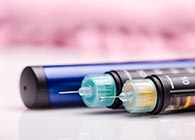“Scotland to rollout diabetes test for Type 1 patients”
This was a headline in November 2021 along with the statement that “Misdiagnosed Type 1 diabetes patients could be freed from the need to take insulin after a new test is rolled out.”
Scotland will become the first country to offer the C-peptide blood test to all patients who have had a Type 1 diagnosis for at least three years. The test became available from 1st November 2021 in Scotland.
The C-peptide test shows how much insulin a patient’s body is producing itself. A healthy pancreas makes equal amounts of insulin and the protein C-peptide. C-peptide is a sign that your body is producing insulin. A high level of C-peptide generally indicates a high level of endogenous insulin production and might indicate that a person does not have Type 1 diabetes at all. A low level (or no C-peptide) indicates that your pancreas is producing little or no insulin, (although a low level may be normal if you have not eaten recently).
The test is simple and inexpensive and was developed by researchers at the University of Exeter Medical School. They developed a new urine test for C-peptide which showed that this simple test carried out in the clinic can accurately measure C-peptide, replacing previous methods which were expensive and time-consuming. These tests are now available in nearly every hospital in the UK, and cost as little as £10.
Development of the test
According to the University of Exeter Medical School, up to 15% cent of insulin-treated patients are misdiagnosed and this rises to 40% of people developing Type 1 diabetes after age 30. Identifying Type 1 diabetes in people over 30 is very difficult.
The researchers identified optimal storage conditions for the samples, previously thought to be unstable. Using a specific preservative means that blood C-peptide is stable for more than 24 hours, so it is viable to conduct a test to be used in primary care and outpatient clinics so removing barriers to implementation that previously blocked widespread adoption of this test in routine care.
The group also demonstrated how urine and blood C-peptide can be used to robustly identify the correct sub type of diabetes, which is essential to getting the right treatment and care. They have also shown that C-peptide can be used as a cheap and convenient test to identify children and young adults with a genetic form of diabetes that requires expensive genetic testing to confirm the diagnosis.
The pilot study
Clinicians at the Western General Hospital in Edinburgh have used the new test on every person in their clinic thought to have Type 1 diabetes for over three years and shown that some actually have other types of diabetes and can stop insulin treatment.
In over 750 people diagnosed as having Type 1 diabetes for 3 years there were the following results when using the C-peptide test:
- a new diagnosis of genetic diabetes in 8 people,
- the diagnosis changed to Type 2 diabetes in 28 other people allowing a change in treatment and 12 of these people were able to stop insulin treatment.
The researchers comment that in some instances, C-peptide testing allowed people to stop very long-standing insulin treatment which can be life-transforming.
The new test is already in available in most NHS trusts, and is now offered to everyone diagnosed as Type 1 diabetes for at least 3 years in Glasgow and Edinburgh.
So now….
There are about 315,000 people living with diabetes in Scotland and the new programme will be offered to people who have been diagnosed with Type 1 diabetes for at least three years.
The tests will be offered at hospital diabetes centres.
Back to news archive



































